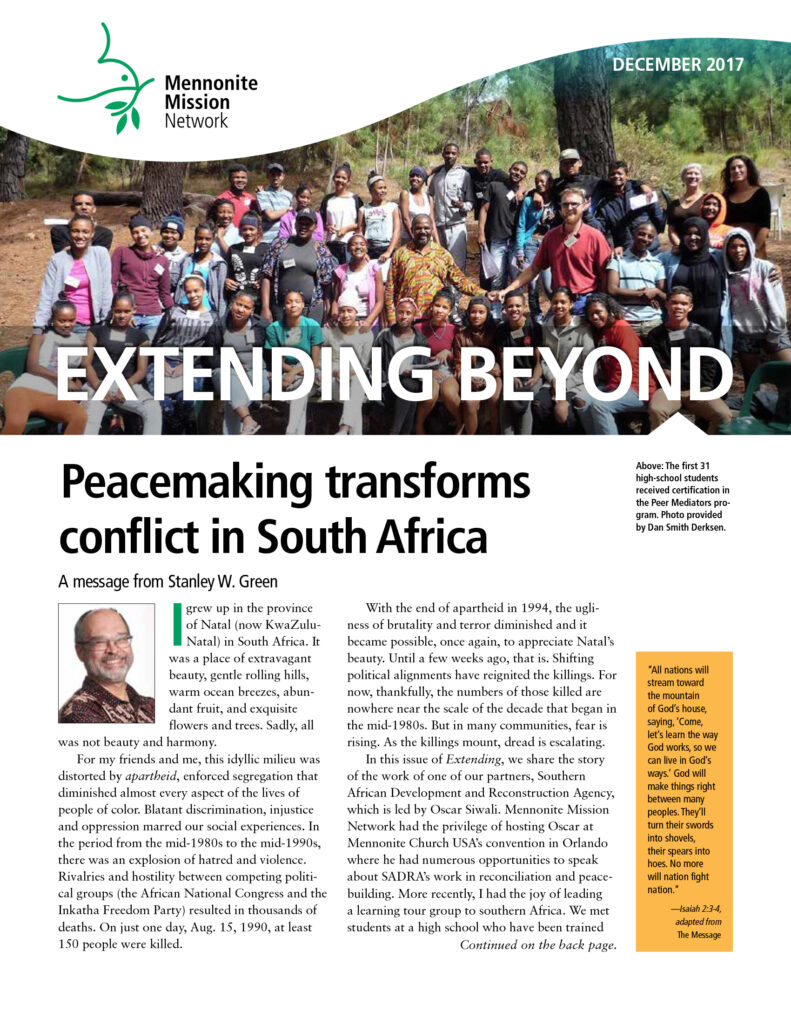"All nations will stream toward the mountain of God’s house, saying, ‘Come, let’s learn the way God works, so we can live in God’s ways.’ God will make things right between many peoples. They’ll turn their swords into shovels, their spears into hoes. No more will nation fight nation."
—Isaiah 2:3-4, adapted from The Message
I grew up in the province of Natal (now KwaZulu-Natal) in South Africa. It was a place of extravagant beauty, gentle rolling hills, warm ocean breezes, abundant fruit, and exquisite flowers and trees. Sadly, all was not beauty and harmony.
For my friends and me, this idyllic milieu was distorted by apartheid, enforced segregation that diminished almost every aspect of the lives of people of color. Blatant discrimination, injustice and oppression marred our social experiences. In the period from the mid-1980s to the mid-1990s, there was an explosion of hatred and violence. Rivalries and hostility between competing political groups (the African National Congress and the Inkatha Freedom Party) resulted in thousands of deaths. On just one day, Aug. 15, 1990, at least 150 people were killed.
With the end of apartheid in 1994, the ugliness of brutality and terror diminished and it became possible, once again, to appreciate Natal’s beauty. Until a few weeks ago, that is. Shifting political alignments have reignited the killings. For now, thankfully, the numbers of those killed are nowhere near the scale of the decade that began in the mid-1980s. But in many communities, fear is rising. As the killings mount, dread is escalating.
In this issue of Extending, we share the story of the work of one of our partners, Southern African Development and Reconstruction Agency, which is led by Oscar Siwali. Mennonite Mission Network had the privilege of hosting Oscar at Mennonite Church USA’s convention in Orlando where he had numerous opportunities to speak about SADRA’s work in reconciliation and peace-building. More recently, I had the joy of leading a learning tour group to southern Africa. We met students at a high school who have been trained as mediators by Oscar, and our workers in that region, Dan and Kathryn Smith Derksen. The students told us stories of how they had been equipped and were able to step into tense situations. We heard several vignettes of violence averted and reconciliation made possible through these students’ ability to advance the possibilities for peace. I was heartened to hear of this ministry of peacemaking and reconciliation.
Later, we met a large group of pastors who are a part of another coalition SADRA works with, The Great Commission. The pastors described to us an intervention for which they were trained that involved them standing between rioting students and the police. Through their public witness of prayer, and their engagement with both sides, they were able to broker peace between the parties and avert unnecessary bloodshed. I was also heartened by this account.
My greatest thrill came, however, when Oscar shared that many of the pastors in this coalition were being further equipped to travel, if needed, from Cape Town to KwaZulu-Natal to stand between the factions and to broker peace. Having observed the massive toll from the earlier political violence, I felt elated that this time there will be agents of peacemaking and reconciliation to bridge the divide and to stem the tide of violence that engulfed my province a quarter-century ago.
I am so grateful for the work of our partners, like SADRA. And I give thanks for you and your sharing that makes possible ministries of reconciliation, peacemaking and rebuilding in troubled places.
Together, we are renewing hope in some very desperate situations by allowing the transforming love and power of Christ’s forgiveness to bring healing and beauty instead of fear and despair. Thank you.
Stanley W. Green
Executive Director

